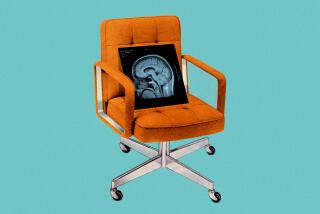Southern California Careers / Dream Jobs : Testing Can Identify Options
- Share via
One of the primary methods counselors use to help introduce their clients to new possibilities is through vocational or aptitude testing. Most counselors caution, however, that testing by itself can be misleading.
Tests provide a place to start. They are not meant to provide absolute answers, said Michael Segovia, spokesman for Consulting Psychologists Press Inc. in Palo Alto, which publishes some of the most widely used testing tools for career counselors.
“Sometimes the poor person walks out thinking [based on the test] he should be a farmer, or a chef,” said Cindy Chernow, regional chairwoman of the Southern California Assn. for Counseling and Development. “People take the results literally.”
The tests are valuable for giving clues that tell you what you like to do, and what you’re good at. If the tests indicate you fit the profile of a funeral director, for example, it doesn’t mean that you should be a funeral director, just that there are some aspects of that job that seem to appeal to you, such as working alone, or working in an unusual occupation, said Rachelle Cohn, part-time director of career counseling at Pierce College.
Your job with the counselor is to go beyond the title, and figure out how that information might help in focusing and setting your career goals.
“A test or instrument should never be used by itself,” Segovia said. It should always be followed by some discussion and analysis to interpret the results. Often, career counselors will use two or more types of tests to get a well-rounded look at what your interests and values are.
For example, the Myers-Briggs Type Indicator test is a personality tool. You answer sets of questions that measure personality traits, such as: “Are you inclined to: a) value sentiment more than logic, or b) value logic more than sentiment?” Or “Which word in each pair appeals to you more: a) quick or b) careful?”
However, this kind of analysis says nothing about your interests, Segovia said, and is often given in conjunction with another test--the Strong Interest Inventory.
The Strong Interest Inventory will ask you to rate how well you think you would like various occupations, such as actor, auto mechanic, bilingual teacher, criminal lawyer or secretary.
It asks you to rate activities, such as looking at things in a clothing store, or climbing along the edge of a steep cliff, and asks preferences, such as whether you’d rather deal with things or people, read a book or watch TV.
Together these tests can give you insight into the types of things you might like to do, and would also be good at, Segovia said.
There are other types of assessment tools.
Richard Knowdell, publisher of the Career Planning and Adult Development Network newsletter in San Jose, has developed a card-sorting test in which you place various cards with different skills listed on them in piles according to how well you like doing them and how good you are at them. At the end of the exercise, you will have a pile of cards that reflects things that you are both good at and interested in.
*
Whenever you take a personality or aptitude test, you should make sure the person who scores the test has training in psychological measurement and assessment, Segovia said. Certified career counselors, for example, have completed graduate work in counseling, which includes course work in testing.
More to Read
Sign up for Essential California
The most important California stories and recommendations in your inbox every morning.
You may occasionally receive promotional content from the Los Angeles Times.








